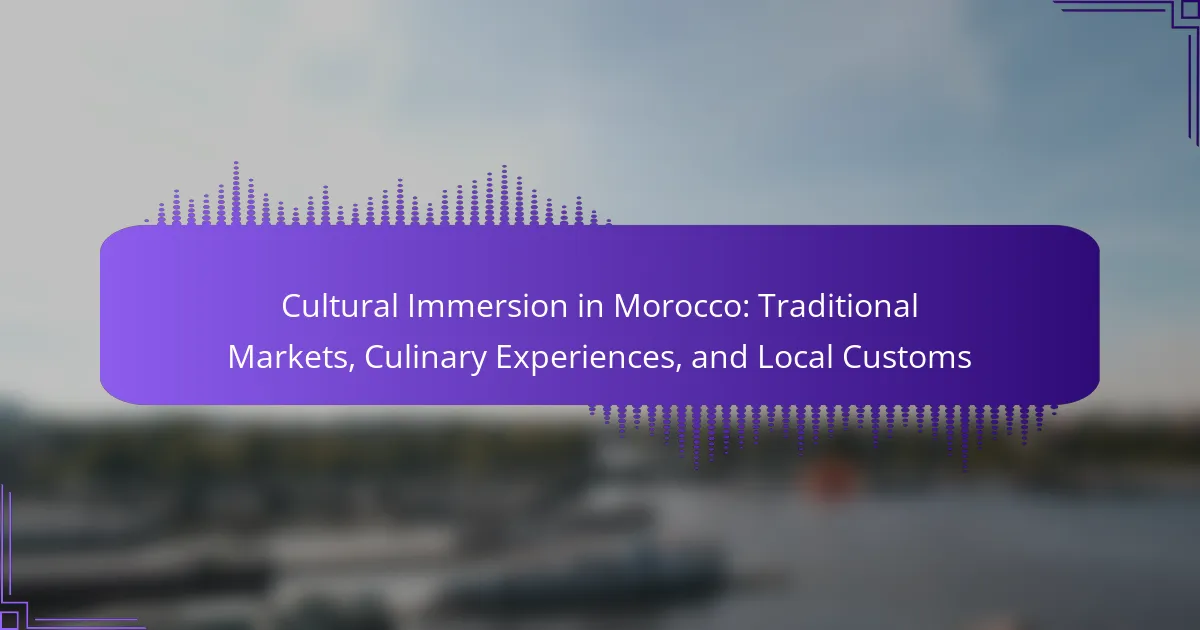Cultural immersion in Morocco offers travelers an authentic experience through vibrant traditional markets, rich culinary adventures, and engaging local customs. Explore the bustling souks filled with spices, textiles, and handcrafted goods. Savor unique Moroccan dishes like tagine and couscous while participating in communal dining. Engage with local traditions, such as tea ceremonies and festivals, to deepen your understanding of Moroccan hospitality and community values.
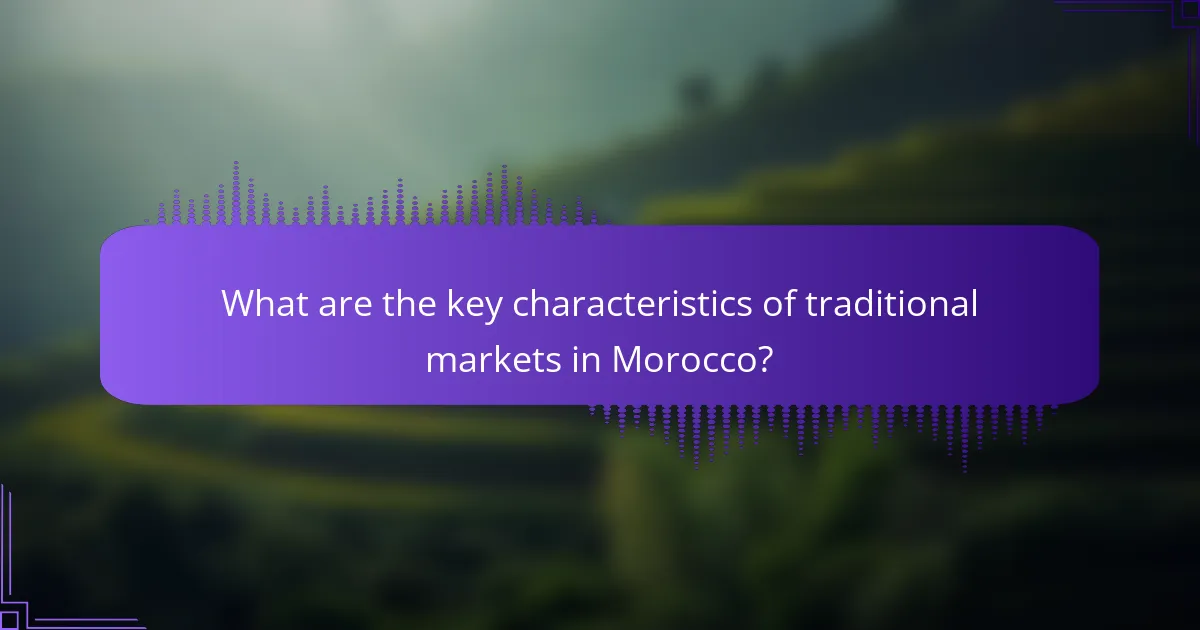
What are the key characteristics of traditional markets in Morocco?
Traditional markets in Morocco are vibrant, bustling spaces characterized by unique products, rich cultural experiences, and strong community ties. They feature a variety of goods, including spices, textiles, and handcrafted items. The markets often have distinct sections for different products, enhancing the shopping experience. Additionally, the atmosphere is lively, with vendors calling out to attract customers and the scents of local cuisine permeating the air. These markets serve as social hubs, where locals gather, exchange news, and maintain traditions.
How do local markets reflect Moroccan culture and heritage?
Local markets in Morocco vividly showcase the country’s culture and heritage through their vibrant atmosphere, traditional crafts, and diverse culinary offerings. These markets, known as souks, serve as social hubs where locals gather, reinforcing community ties.
The intricate craftsmanship seen in handmade goods, such as pottery and textiles, reflects Morocco’s rich artistic traditions. Local markets also offer authentic Moroccan cuisine, featuring dishes like tagine and couscous, which are integral to the nation’s culinary identity.
Additionally, the sensory experience of the markets—aromas of spices, sounds of merchants, and colorful displays—immerses visitors in Moroccan life. This cultural immersion fosters appreciation for the nation’s customs and historical influences, making local markets a vital aspect of Morocco’s cultural landscape.
Which traditional markets are most popular among tourists?
Marrakech’s souks are the most popular traditional markets among tourists. These vibrant markets offer a rich cultural experience through their unique crafts, spices, and local foods. The souks are known for their maze-like layout, bustling atmosphere, and the opportunity to engage with local artisans. Other notable markets include Fes’ medina, famous for its leather goods, and Essaouira’s artisan market, showcasing woodwork and textiles. Each market provides a distinct glimpse into Moroccan culture and traditions.
What unique products can be found in Moroccan souks?
Moroccan souks offer unique products like handcrafted pottery, traditional textiles, and artisanal jewelry. These items reflect the rich cultural heritage and craftsmanship of Morocco. For instance, you can find vibrant rugs made by local artisans, each telling a story through its intricate patterns. Souks also feature spices, perfumes, and leather goods, showcasing the diverse offerings that attract visitors seeking authentic Moroccan experiences.
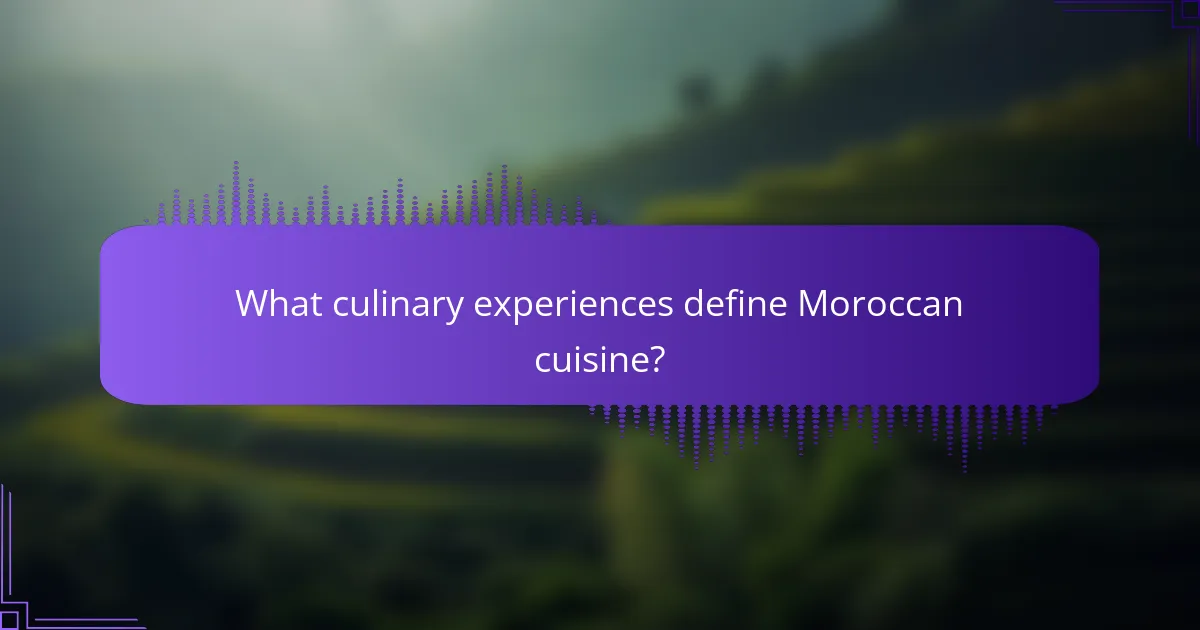
What culinary experiences define Moroccan cuisine?
Moroccan cuisine is defined by its rich flavors, diverse ingredients, and unique cooking techniques. Key culinary experiences include visiting souks, where spices and fresh produce abound, and enjoying traditional dishes like tagine and couscous. The use of spices such as saffron, cumin, and coriander enhances the depth of flavors. Unique attributes include the communal dining style, where meals are often shared, fostering a sense of togetherness. Rare experiences, such as participating in a Moroccan cooking class, allow for deeper cultural immersion and understanding of local customs.
Which traditional dishes should visitors try in Morocco?
Visitors to Morocco should try tagine, couscous, pastilla, harira, and mechoui. These traditional dishes reflect the rich culinary heritage of the country.
Tagine, a slow-cooked stew, features various meats, vegetables, and spices, served in a distinctive earthenware pot. Couscous, often considered the national dish, consists of steamed semolina served with vegetables and meats. Pastilla, a savory pie, combines pigeon or chicken with almonds and spices, encased in flaky pastry. Harira, a hearty soup, is traditionally enjoyed during Ramadan, made with tomatoes, lentils, and chickpeas. Mechoui, a whole roasted lamb, showcases Moroccan grilling techniques and is often served at festive occasions.
These dishes offer a unique insight into Moroccan culture and flavors, making them essential for culinary exploration.
How does Moroccan cuisine incorporate local ingredients?
Moroccan cuisine incorporates local ingredients through vibrant markets, seasonal produce, and traditional cooking methods. Fresh herbs, spices, and vegetables are staples in dishes like tagine and couscous, reflecting regional agricultural practices. Local markets, or souks, offer a variety of ingredients, emphasizing the importance of community and cultural heritage. Seasonal availability influences menus, ensuring dishes are both fresh and flavorful.
What role do spices play in Moroccan cooking?
Spices are essential in Moroccan cooking, providing depth and complexity to dishes. They reflect the country’s rich cultural heritage and regional diversity. Key spices like cumin, coriander, and saffron enhance flavors and aromas, making meals vibrant and memorable. The unique combination of spices in traditional recipes contributes to the distinctive taste of Moroccan cuisine, showcasing the culinary artistry present in local markets.
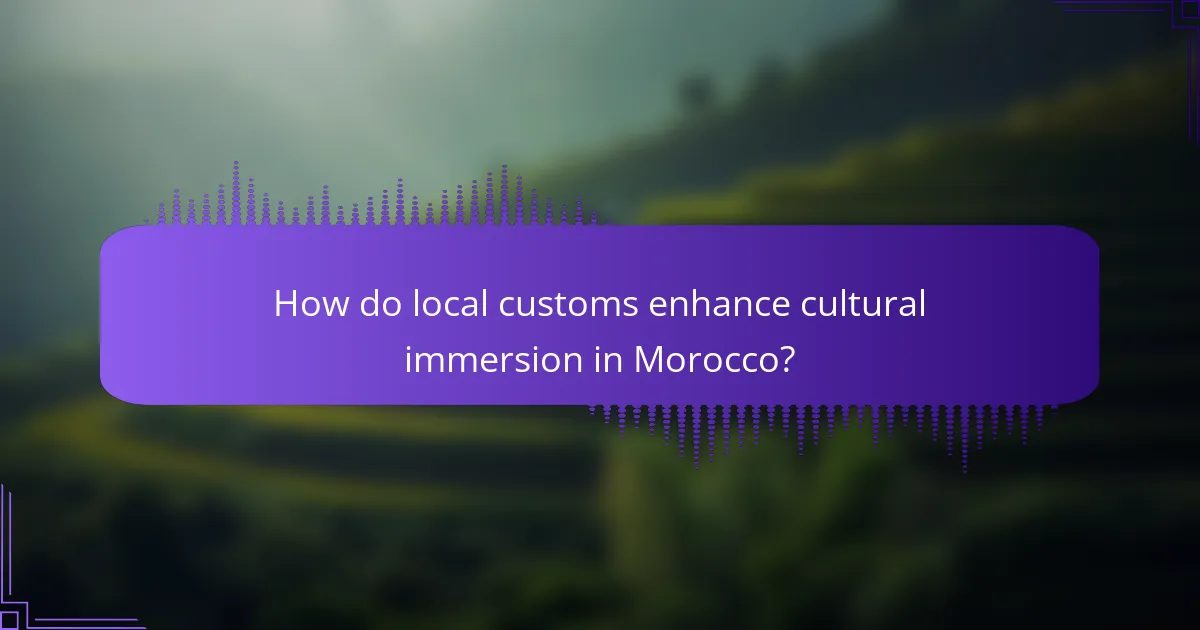
How do local customs enhance cultural immersion in Morocco?
Local customs significantly enhance cultural immersion in Morocco by fostering authentic connections. Engaging with traditions, such as tea ceremonies and local festivals, allows visitors to experience Moroccan hospitality firsthand. Markets, known as souks, showcase unique crafts and culinary delights, enriching the sensory experience. Participating in these customs deepens understanding of Moroccan identity and community values.
What are the most significant cultural practices in Moroccan society?
Moroccan society features significant cultural practices, including vibrant traditional markets, diverse culinary experiences, and unique local customs. These elements reflect the country’s rich heritage and communal values.
Traditional markets, or souks, are central to Moroccan culture, offering a variety of goods and fostering social interaction. Culinary experiences highlight the importance of food, with dishes like tagine and couscous embodying communal dining traditions. Local customs, such as hospitality and family gatherings, play a crucial role in daily life, emphasizing respect and connection among community members.
These practices not only enhance cultural immersion but also showcase Morocco’s blend of influences from Arab, Berber, and French cultures.
How do festivals and celebrations reflect Moroccan traditions?
Festivals and celebrations in Morocco deeply reflect the nation’s traditions through vibrant expressions of culture. They showcase the rich history, diverse influences, and communal values of Moroccan society. Events like Eid al-Fitr and the Fes Festival of World Sacred Music highlight religious observances and artistic heritage. These gatherings often feature traditional music, dance, and culinary delights that embody regional flavors and customs. Additionally, festivals serve as a platform for local artisans, promoting crafts that have been passed down through generations. This cultural immersion fosters community bonds and preserves the unique identity of Moroccan traditions.
What etiquette should visitors observe when interacting with locals?
Visitors in Morocco should respect local customs, greet warmly, and dress modestly. Acknowledging traditional practices fosters mutual respect. Engage in polite conversation, and always ask permission before photographing individuals. Bargaining is expected in markets, but do so with a friendly demeanor. Additionally, sharing food or drink is a sign of hospitality; accept offerings graciously.
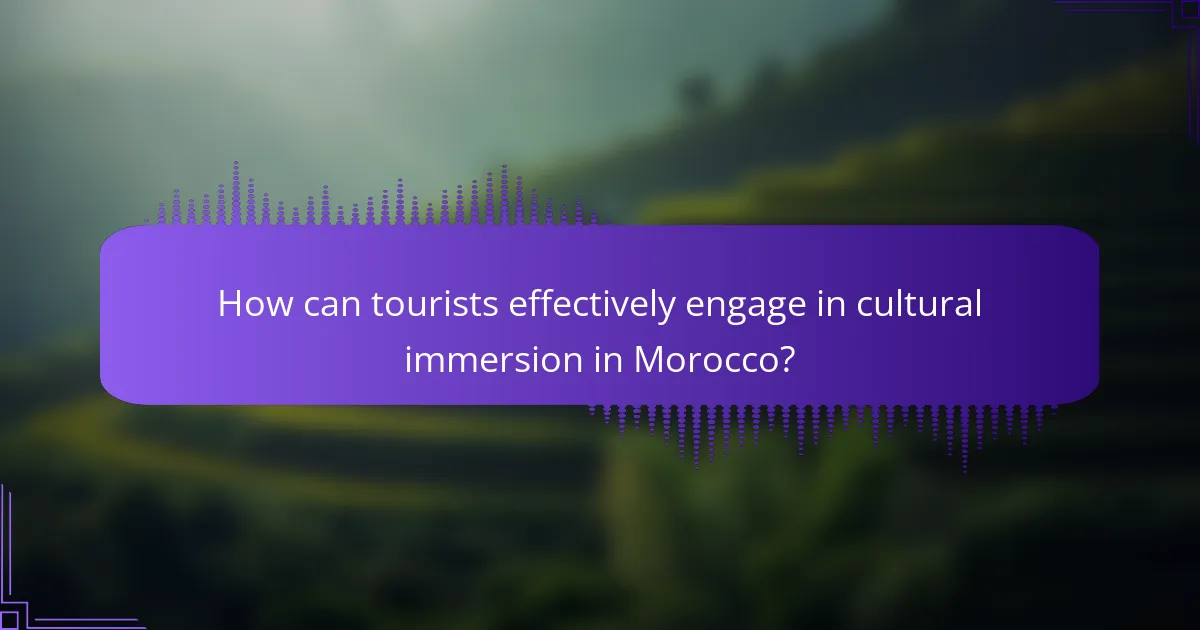
How can tourists effectively engage in cultural immersion in Morocco?
Tourists can effectively engage in cultural immersion in Morocco by exploring traditional markets, savoring local cuisine, and participating in local customs. Visiting souks allows tourists to interact with artisans and learn about traditional crafts. Culinary experiences, such as cooking classes or food tours, provide insight into Moroccan flavors and techniques. Engaging in local customs, like attending festivals or participating in communal meals, fosters deeper connections with the culture.
What are the best strategies for navigating traditional markets?
To navigate traditional markets in Morocco effectively, immerse yourself in the local culture and customs. Engage with vendors, learn basic Arabic phrases, and explore various stalls to appreciate the rich diversity of products.
1. Observe local bargaining practices to negotiate effectively.
2. Sample street food to enjoy authentic culinary experiences.
3. Respect local customs and etiquette to foster good relationships.
4. Visit markets during off-peak hours for a more relaxed experience.
5. Document experiences for future reference and sharing.
How can travelers enhance their culinary experiences in Morocco?
Travelers can enhance their culinary experiences in Morocco by engaging with local markets, participating in cooking classes, and sampling street food. Visiting souks offers insight into traditional ingredients like spices and olives. Cooking classes allow hands-on experience with dishes like tagine, fostering deeper cultural appreciation. Street food tours introduce authentic flavors, highlighting the vibrant culinary scene. Engaging with locals provides unique insights into customs and food preparation, enriching the overall experience.
What tips can help visitors respect and understand local customs?
Visitors can respect and understand local customs in Morocco by observing, asking questions, and participating in cultural activities. Engaging with locals enhances the experience and fosters mutual respect.
1. Observe interactions: Watch how locals greet and communicate.
2. Ask questions: Inquire about customs and traditions respectfully.
3. Participate in rituals: Join in local celebrations or practices.
4. Dress appropriately: Wear traditional attire when visiting significant sites.
5. Learn basic phrases: Use simple Arabic or Berber greetings to connect.
6. Respect dining etiquette: Familiarize yourself with local dining customs.
Which common mistakes should travelers avoid when immersing in Moroccan culture?
Travelers should avoid being disrespectful to local customs, neglecting to learn basic Arabic phrases, and overlooking dress codes. Engaging genuinely with locals enhances cultural experiences. Additionally, haggling is expected in markets, so failing to participate can lead to missed opportunities for connection. Lastly, ignoring dietary restrictions can offend hosts during culinary experiences.
